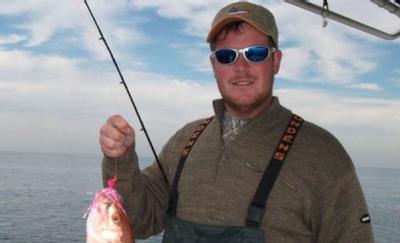

Recent Posts
Murrells Inlet fishing community celebrates life of pioneer who passed unexpectedly
Posted: October 23, 2019 11:48 AM
Commercial Fisherman Feel Effects of Fishing Ban
Posted: February 21, 2012 5:20 AM
Seven Seas Sponsors Community Oyster Roast
Posted: January 23, 2012 7:53 AM
Chris' Opinion Published in The Sun News
Posted: October 18, 2011 8:13 AM
Captain and Crew of F/V CJR Rescued By Coast Guard
Posted: January 25, 2011 6:16 AM
Chris Published in the "Weekly Surge"
Posted: January 7, 2011 11:38 AM
Run Away Boat Causes Captain to Fish over Christmas Holidays
Posted: December 7, 2010 3:55 AM
Catch Share Fishing Plan Needed
Posted: November 30, 2010 8:06 AM
 Back
Back
Catch Share Fishing Plan Needed
Posted By: Chris Conklin | November 30, 2010 8:06 AM

Tourists around the nation travel to Myrtle Beach looking for fun, sun, and local seafood cuisine. What these tourists don’t know is that fresh-caught seafood is hard to come by these days. Harsh fishing regulations are keeping fresh fish off the menu and out of local markets, including mine. They’re also hurting jobs: right now I have seven boats— with three crewmembers each — tied to the dock.
If South Carolina values its long commercial fishing heritage, jobs and tourism, things had better change fast. Luckily, there is a way forward.
I was born the son of a commercial fisherman and have worked in the fishing industry since I was 13. I run my family’s small fish house and fishing business out of Murrells Inlet. I’m a young guy who would like to own the family business one day. That is, if it can last that long. Now I constantly ask myself if I should find another job.
When fishing seasons do open up again, our fishermen will have to race to catch as many fish as they can before they’re off limits again, even in bad whether. This is dangerous— I have seen crews and boats lost in bad weather as recently as last week—and nothing more than a race to the end of the fishing industry.
There is a ray of hope. Catch shares, a fisheries management concept with a strong history of rebuilding fisheries and commercial fishing, reduces the need for closures and keeps fishermen working on the water, all the while aggressively rebuilding depleted fish stocks.
Catch shares work by fairly allotting a percentage of the total amount of fish to each fisherman for the long term, and allow him to catch it throughout the year. He can time his fishing with the needs of fish houses, tourist seasons and restaurants to provide local fish for more of the year. When a fisherman is ready to retire, he can sell his percentage of fish. If a young fisherman wants to grow a business, he can buy more. In return for this flexibility, each fisherman meets strict fish counting and reporting requirements, which improve fisheries science.
Catch share management is proven around the world and close to home in the Gulf of Mexico. Gulf red snapper fishermen have been fishing under a catch share for over three years. Before, they were in the same dire situation we are in now. Now, they have a year round season, they don’t go out in bad weather and they can go out when market demand for fish is high.
Gulf fishermen now have the flexibility to run stable fishing businesses that they’re proud to pass on to their children. When I recently went to Washington, D.C. to tell Congress about our region’s fishery problems, I saw Gulf commercial fishermen who are happy with catch shares and recreational fishermen who want them.
Southeast fisheries are similar to Gulf fisheries and we deserve the same benefits they’ve seen with catch shares. We can also help meet our community’s needs. For example, a well designed catch share could work to protect small fishing businesses by limiting the amount of fish each business can have, so that one business doesn’t buy up too many fish and force others out. As a small businessman, I support this.
The good news is that some folks are listening. The South Atlantic Fishery Management Council, which manages the region’s fisheries, is considering several options—including catch shares—to reduce fishing closures and get fishermen back on the water. They need to put a catch share in place quickly, before longtime businesses fail and younger generations leave to find stable jobs.
Catch shares maintain our fishery’s future by rebuild fish populations, putting fishermen back on the water and fresh local fish back on plates.
Christopher Conklin runs a family-owned fish house, Seven Seas Seafood, and commercial fishing business out of Murrells Inlet, S.C.

